Leading Chinese conglomerate, BYD Co. Ltd., is reportedly considering the acquisition of lithium mining assets in Brazil. This strategic move is part of the company’s plan to secure raw material supplies to expand its electric vehicle (EV) strategy.
BYD has pledged to invest nearly US$625M in Brazil to build its first electric-car plant outside of Asia as the Chinese giant seeks to extend its geographical reach amid a global surge in EV sales.
The Tesla rival plansto build a production complex in the northeastern state of Bahia. The facility will include hybrid and standard EV production, a unit focused on chassis for electric buses and trucks, and one to process lithium and iron phosphate for the international market. Operations are expected to start by 2024.
BYD has rapidly grown into a publicly listed mega company with its headquarters in Shenzhen, China. The company operates two major subsidiaries, BYD Auto and BYD Electronic, and has worked fervently to establish itself as the world’s largest EV manufacturer and as a significant player in the production of battery-powered bicycles, forklifts, solar panels, and rechargeable batteries.
With the global shift towards renewable energy and the increasing demand for EVs, securing a stable supply of lithium has become a strategic priority for manufacturers.
BYD’s potential investment in lithium mining assets in Brazil is a proactive step towards ensuring a steady supply of this crucial raw material. The company’s new EV factory will include a unit dedicated to processing lithium and iron phosphate for the international market.
“We prefer to buy any available and affordable resource, but it needs to be competitive. At the same time, BYD also prefers to own some mining operations in Brazil.” Stella Li, BYD’s global vice-president, said in an interview.
The global demand for lithium is surging due to increasing EVs sales. However, there are concerns about whether there is enough lithium available globally to meet growing demand. Analysts believe there could be a potential shortfall in the global mining capacity required to extract the minerals needed to manufacture sufficient batteries to meet projected EV demand. BYD’s move to secure lithium assets underscores the strategic importance of raw material supply chains in the rapidly growing EV industry. As demand continues to rise, huge companies will continue to allocate significant investments to ensure they have access to the necessary raw materials.












